Breathe Easy: The Top Benefits of Using Air Purifiers at Home
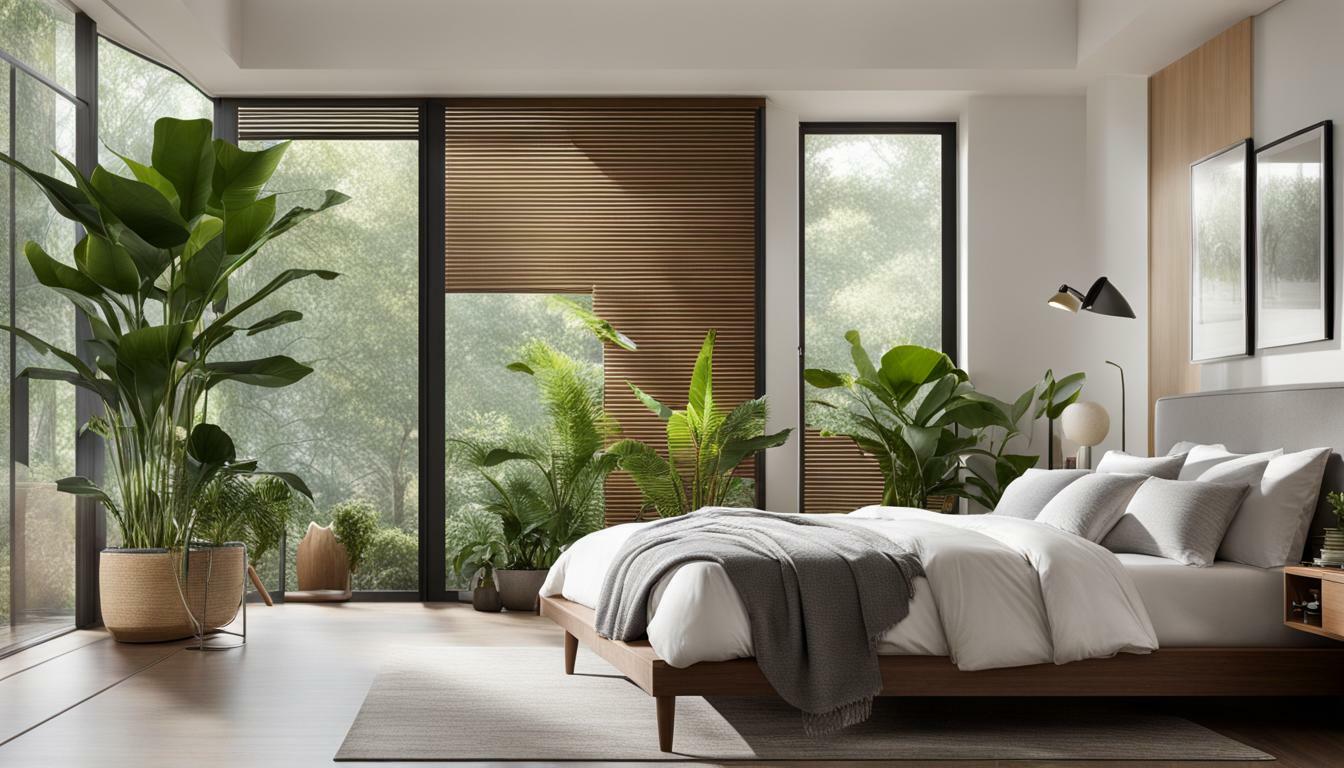
Air purifiers have become increasingly popular in homes as people recognise the importance of clean, safe air. These devices offer a range of benefits for improving indoor air quality and overall health. By eliminating airborne pathogens and pollutants, air purifiers create a healthier living environment for you and your family. Let’s explore the top benefits of using air purifiers in your home.
Key Takeaways:
- Air purifiers can eliminate unpleasant odours and create a more pleasant living environment.
- They reduce dust, bacteria, and other contaminants, reducing the need for frequent cleaning.
- Air purifiers can help prevent mold growth and insect infestations.
- For individuals with respiratory conditions, air purifiers can alleviate symptoms and prevent flare-ups.
- Choosing the right air purifier based on room size, filter type, and additional features is crucial for optimal performance.
Understanding Air Quality and Indoor Pollutants
Indoor air quality is a vital aspect of our overall well-being, yet it is often overlooked. We spend a significant amount of time indoors, especially in our homes, and the quality of the air we breathe can have a profound impact on our health.
Without proper ventilation, pollutants can accumulate indoors, leading to a range of health issues. Common indoor pollutants include dust, pollen, pet dander, mold spores, volatile organic compounds (VOCs) from household cleaners and paints, and even tobacco smoke. These pollutants can trigger allergies, asthma attacks, and other respiratory problems.
“The indoor air quality in most homes is two to five times worse than outdoor air quality.” – Environmental Protection Agency (EPA)
Fortunately, air purifiers are designed to combat indoor pollutants and improve air quality. These devices work by filtering the air and capturing microscopic particles, reducing the presence of allergens and irritants. Different types of air purifiers use various technologies, such as UVGI, mechanical filtration, electrostatic, gas phase, and HEPA filters, to target specific contaminants in the air.
By investing in an air purifier, you can ensure that the air you and your family breathe at home is clean and free from harmful pollutants. Improved air quality can lead to better respiratory health, reduced allergy and asthma symptoms, and a more comfortable living environment. Take the time to research and choose an air purifier that suits your needs, considering factors like room size, filter type, and additional features. Your health and well-being deserve the best air quality possible.

The Impact of Airborne Pathogens on Respiratory Health
Airborne pathogens, such as viruses, bacteria, and allergens, can pose a significant threat to our respiratory health. These microscopic particles can easily enter our respiratory system when we breathe, leading to a range of respiratory conditions and illnesses. Allergens, for example, can trigger allergic reactions and exacerbate symptoms in individuals with allergies or asthma. Bacteria and viruses can cause respiratory infections, such as the common cold, flu, and even more serious diseases.
To protect ourselves from the harmful effects of airborne pathogens, it is crucial to maintain clean and purified air in our homes. This is where air purifiers come in. Air purifiers are designed to filter out these contaminants, trapping them in their filtration systems and preventing them from circulating in the air we breathe.
By using air purifiers, we can significantly reduce our exposure to airborne pathogens, improving our respiratory health and overall well-being. These devices can help alleviate symptoms in individuals with respiratory conditions and provide relief from allergies and asthma. In addition to removing harmful particles from the air, air purifiers can also eliminate unpleasant odors, reduce the need for frequent cleaning, and create a more comfortable living environment.
Protecting Your Respiratory Health with Air Purifiers
Investing in an air purifier is a proactive step towards protecting your respiratory health. With the right air purifier, you can create a clean and healthy environment in your home, free from the harmful effects of airborne pathogens. Take the time to research and choose an air purifier that suits your needs, considering factors such as room size, filtration system, and additional features. With regular maintenance and filter replacements, your air purifier can effectively remove airborne pathogens and improve the air quality in your home.

“Clean air is not only important for our respiratory health but also for our overall well-being. Investing in an air purifier can help create a healthier home environment, where you and your family can breathe easy and enjoy the benefits of clean, purified air.”
How Air Purifiers Work: A Closer Look at Filtration Systems
Air purifiers employ various filtration systems to clean the air we breathe, ensuring that airborne pathogens are effectively removed. These devices play a crucial role in improving indoor air quality and promoting a healthier living environment. One of the key components of air purifiers is the HEPA filter, or High-Efficiency Particulate Air filter.
The HEPA filter is designed to capture microscopic particles, such as dust, pollen, pet dander, and even bacteria, trapping them within its dense fibers. This filtration system is highly effective in removing contaminants from the air, making it an essential feature for anyone concerned about their respiratory health.
In addition to HEPA filters, air purifiers may also utilize other filtration technologies to address specific pollutants. For example, activated carbon filters can effectively absorb odors and volatile organic compounds (VOCs), improving the overall air quality. UVGI (Ultraviolet Germicidal Irradiation) technology can kill airborne pathogens, such as bacteria and viruses, by emitting ultraviolet light.
By combining different filtration systems, air purifiers can provide comprehensive air cleaning capabilities. They can help reduce allergens, minimize the presence of airborne viruses and bacteria, and eliminate unpleasant odors. With regular use, air purifiers can create a cleaner, fresher indoor environment, benefiting individuals with respiratory conditions and promoting overall well-being.
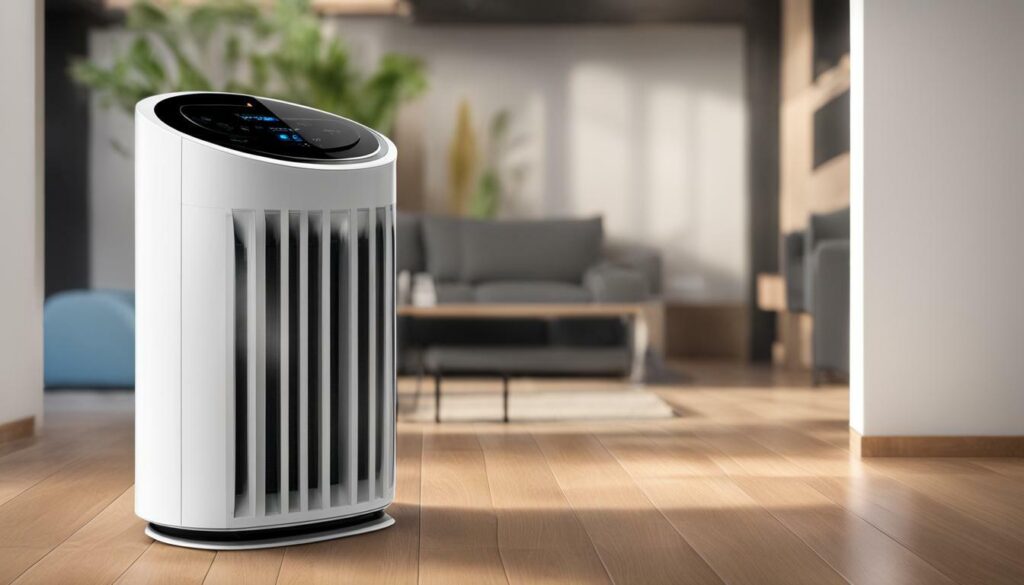
Overall, air purifiers are an invaluable tool for improving the air quality in your home. With their diverse filtration systems, including HEPA filters, activated carbon filters, and UVGI technology, these devices can effectively remove airborne pathogens and pollutants. Whether you suffer from allergies, asthma, or simply want to create a healthier living space, investing in an air purifier is a worthwhile decision. Consider factors such as room size, filter type, and additional features when choosing the right air purifier for your needs. Breathe easier and enjoy the benefits of cleaner air with the use of an air purifier in your home.
Choosing the Right Air Purifier for Your Home
With numerous options available in the market, choosing the right air purifier for your home can be a daunting task. However, by understanding your specific needs and considering a few key factors, you can make an informed decision. Here are some important points to keep in mind when selecting an air purifier:
- Room size: Consider the square footage of the room where you intend to use the air purifier. Different models have varying coverage capacities, so be sure to choose one that is suitable for the size of your space.
- Filter type: Determine the type of pollutants you wish to target. HEPA filters are highly effective in capturing airborne particles such as dust, pollen, pet dander, and mold spores. Activated carbon filters are ideal for eliminating odors, smoke, and volatile organic compounds (VOCs).
- Additional features: Look for air purifiers that offer additional features that cater to your specific needs. Some models have built-in sensors that monitor air quality and automatically adjust the fan speed. Others may have programmable timers, remote controls, or even Wi-Fi connectivity for convenient operation.
By considering factors such as room size, filter type, and additional features, you can choose the right air purifier that best suits your needs. Investing in a high-quality air purifier is an investment in the health and well-being of you and your family.

The Benefits of Using Air Purifiers for Allergy and Asthma Sufferers
For allergy and asthma sufferers, air purifiers can be a game-changer, significantly improving their quality of life. These individuals are often more sensitive to allergens and irritants in the air, which can trigger symptoms and exacerbate their conditions. Air purifiers can help alleviate these issues by effectively removing allergens such as pollen, dust mites, pet dander, and mold spores from the air.
By utilizing high-efficiency particulate air (HEPA) filters, air purifiers can capture particles as small as 0.3 microns, trapping the majority of allergens and providing cleaner air to breathe. This can lead to a reduction in allergy and asthma symptoms, including sneezing, coughing, wheezing, and difficulty breathing. With cleaner air, allergy and asthma sufferers may experience fewer flare-ups and enjoy a better quality of life.
In addition to removing allergens, air purifiers can also filter out other respiratory irritants such as dust, smoke, and volatile organic compounds (VOCs) emitted by household products. This can further improve respiratory health and create a healthier indoor environment for allergy and asthma sufferers.
The Importance of Choosing the Right Air Purifier
When selecting an air purifier for allergy and asthma relief, it’s crucial to consider several factors:
- The room size: Ensure the air purifier has the appropriate coverage for the room where it will be used.
- The type of filter: HEPA filters are highly recommended for their efficiency in capturing allergens and pollutants.
- Additional features: Some air purifiers offer features like ionizers or carbon filters, which can enhance their performance.
By choosing the right air purifier, allergy and asthma sufferers can maximize the benefits and improve their respiratory health. With cleaner air, they can breathe easier and enjoy a more comfortable living space.
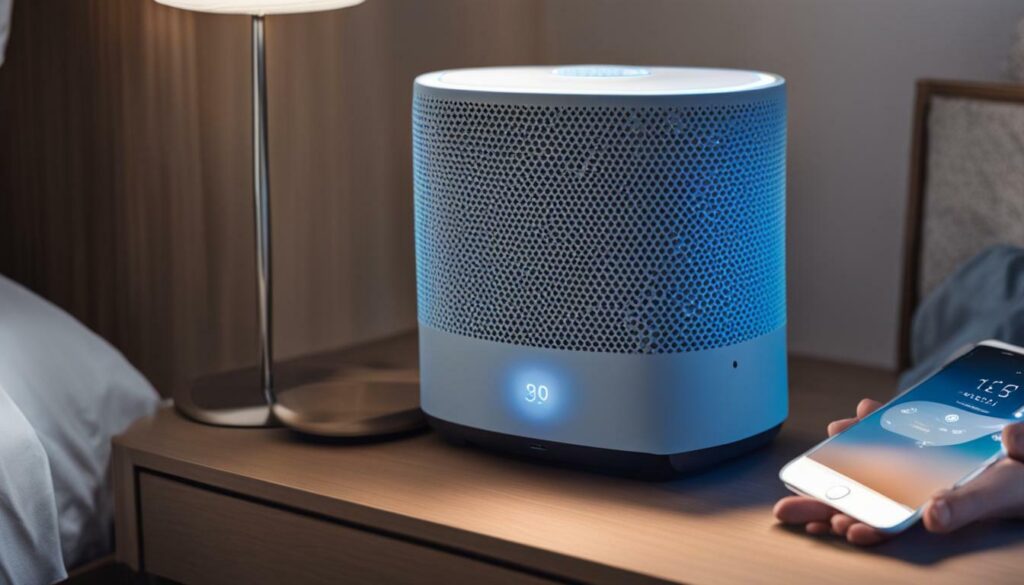
Additional Benefits of Using Air Purifiers at Home
The benefits of using air purifiers extend beyond improved indoor air quality and respiratory health. These devices offer a range of advantages that can enhance your overall well-being and create a healthier home environment.
One of the key benefits of air purifiers is their ability to eliminate unpleasant odors. Whether it’s the lingering smell of cooking, pet odors, or stale air, air purifiers work to remove these odors and create a fresher, more pleasant living space. Say goodbye to constantly lighting scented candles or using air fresheners, as an air purifier can effectively tackle these odors at the source.
Furthermore, air purifiers can reduce the need for frequent cleaning. By capturing and trapping dust, pollen, and other allergens, they help to keep surfaces cleaner for longer periods. This means less time spent dusting and vacuuming, giving you more time to relax and enjoy your home. Additionally, by reducing airborne bacteria and mold spores, air purifiers can also decrease the likelihood of mold growth and insect infestations, creating a healthier living environment.
For individuals with respiratory conditions like asthma or allergies, air purifiers can be a game-changer. These devices work to remove allergens from the air, such as pet dander, pollen, and dust mites, preventing flare-ups and alleviating symptoms. With cleaner air circulating in your home, you can breathe easier and enjoy a better quality of life.

Installing an air purifier can lead to improved air quality, better sleep, reduced odors, protection for sensitive individuals, and increased energy efficiency.
The benefits of using air purifiers go beyond the obvious. They not only improve indoor air quality and promote respiratory health, but they also create a more pleasant living environment by eliminating odors and reducing the need for frequent cleaning. For those with allergies or asthma, air purifiers can provide much-needed relief, while also protecting sensitive individuals from airborne pollutants. When choosing an air purifier, consider the size of your room, the type of filter, and any additional features that may be beneficial. With these factors in mind, investing in an air purifier can greatly contribute to a healthier and happier home.
Factors to Consider When Maintaining Your Air Purifier
To ensure that your air purifier continues to provide clean, safe air, proper maintenance is essential. Regular maintenance not only extends the lifespan of your device but also ensures its optimal performance in removing airborne pathogens and pollutants. Here are some important factors to consider when maintaining your air purifier:
- Clean or replace filters: The filters in your air purifier are responsible for capturing and trapping contaminants. Over time, these filters can become clogged with particles, reducing their efficiency. Refer to your manufacturer’s instructions for guidance on when to clean or replace the filters. For HEPA filters, it is recommended to replace them every 6 to 12 months to ensure maximum effectiveness in removing allergens, dust, and other airborne pollutants.
- Clean the exterior: Dust and debris can accumulate on the exterior of your air purifier, affecting its overall performance. Regularly wipe down the device with a soft cloth or use a vacuum cleaner with a brush attachment to remove any dirt or dust that has settled on the surface.
- Check the seals: Air leaks can compromise the efficiency of your air purifier. Inspect the seals and gaskets regularly to ensure that they are intact and not allowing air to escape. If you notice any gaps or damage, replace the seals or contact the manufacturer for assistance.
- Monitor the air quality: Some air purifiers are equipped with sensors that monitor the air quality in your home. Pay attention to any alerts or notifications indicating a decline in air quality or the need for maintenance. These features can help you stay proactive in maintaining your air purifier.
By following these maintenance tips, you can ensure that your air purifier operates at its best, providing you and your family with clean, healthy air. Remember, a well-maintained air purifier not only improves indoor air quality but also promotes better respiratory health and overall well-being.
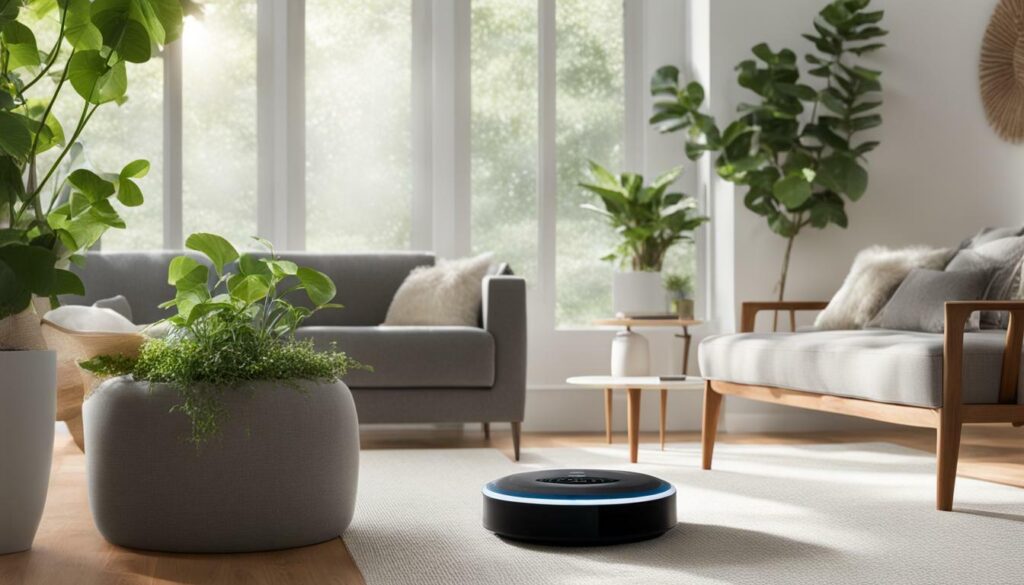
Additional Tips for HEPA Filter Maintenance
If your air purifier utilizes a HEPA filter, which is highly effective at capturing small particles, it is crucial to take extra care in maintaining it. Here are some additional tips:
- Handle the filter with clean hands to avoid transferring dirt or oils onto the surface.
- Regularly vacuum the pre-filter, which helps prolong the life of the HEPA filter by capturing larger particles.
- Consider investing in a filter monitor that tracks the lifespan of your HEPA filter and notifies you when it needs replacement.
- Store any spare filters in a clean, dry place to prevent them from collecting dust or moisture.
By following these tips and incorporating regular maintenance into your routine, you can ensure the longevity and effectiveness of your air purifier, allowing you to breathe cleaner, healthier air.
The Link Between Air Purifiers and Better Sleep
Creating a bedroom environment conducive to quality sleep involves more than just a comfortable mattress and soft pillows. The air you breathe throughout the night can also have a significant impact on the quality of your sleep. This is where air purifiers come in. These devices are designed to clean the air by removing pollutants and allergens, creating a healthier and more restful sleeping environment.
According to studies, poor indoor air quality can disrupt sleep patterns and contribute to sleep disorders. Common indoor pollutants like dust, pet dander, pollen, and mold spores can trigger allergies and respiratory issues, leading to restless nights and daytime fatigue. Air purifiers effectively capture and remove these airborne particles, ensuring the air you breathe while sleeping is clean and free from potential triggers.
By improving air quality, air purifiers can also reduce nighttime congestion and snoring, leading to a more peaceful sleep for both you and your partner. Additionally, air purifiers with HEPA filters can effectively filter out fine particles, including viruses and bacteria, which can be especially beneficial for those who are more susceptible to respiratory infections.
Investing in an air purifier for your bedroom can have a positive impact on your overall sleep quality. Reduced allergens and pollutants in the air can lead to fewer disruptions during the night, allowing you to experience deeper, more rejuvenating sleep. So, if you’re looking to enhance your sleep environment and wake up feeling refreshed every morning, consider adding an air purifier to your bedroom setup.
The air you breathe while sleeping plays a crucial role in the quality of your rest. Air purifiers can help ensure cleaner, healthier air, free from pollutants and allergens, for a more restful sleep.
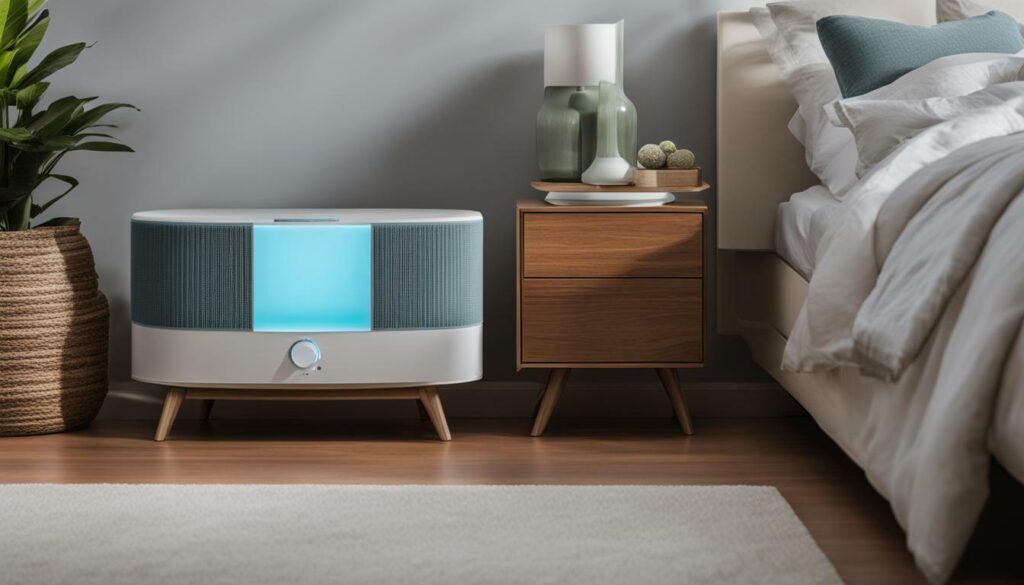
Key Takeaways:
- Air purifiers can improve indoor air quality, reducing the presence of allergens and pollutants that can disrupt sleep.
- Poor air quality can contribute to sleep disorders and daytime fatigue.
- Air purifiers with HEPA filters can effectively remove fine particles, including viruses and bacteria, promoting better respiratory health.
- Investing in an air purifier for your bedroom can lead to deeper, more restful sleep and overall improved well-being.
Conclusion
Investing in an air purifier is a proactive step towards safeguarding your health and ensuring cleaner, safer indoor air for you and your loved ones. Air purifiers have a range of benefits for improving indoor air quality and overall health. They can eliminate unpleasant odours, such as cooking smells and pet odours, creating a more pleasant living environment.
By cleaning the air and reducing dust and bacteria, air purifiers can also reduce the need for frequent cleaning and decrease the likelihood of mold growth and insect infestations. For those with respiratory conditions like asthma or allergies, air purifiers can help prevent flare-ups and alleviate symptoms.
Different types of air purifiers, including UVGI, mechanical filtration, electrostatic, gas phase, and HEPA filters, target specific contaminants in the air. Installing an air purifier can lead to improved air quality, better sleep, reduced odours, protection for sensitive individuals, and increased energy efficiency. It is important to consider the size of the room, type of filter, and additional features when choosing an air purifier.
Overall, air purifiers are a worthwhile investment for a healthier home environment. With their ability to remove airborne pathogens and indoor pollutants, they provide peace of mind and contribute to better overall well-being. So why wait? Take the first step towards a cleaner and healthier living space by installing an air purifier today.
FAQ
Q: What are the benefits of using air purifiers at home?
A: Air purifiers have several benefits, including improved indoor air quality, reduced odors, decreased cleaning needs, protection against insect infestations, and relief for individuals with respiratory conditions.
Q: How do air purifiers work?
A: Air purifiers work by using various filtration systems to remove pollutants and airborne pathogens from the air, such as HEPA filters, UVGI, mechanical filtration, electrostatic, and gas phase filters.
Q: What factors should I consider when choosing an air purifier?
A: It is important to consider the size of the room, the type of filter, and any additional features when choosing an air purifier for your home.
Q: Can air purifiers help with allergies and asthma?
A: Yes, air purifiers can help reduce allergens in the air, providing relief for individuals with allergies and asthma by alleviating symptoms and preventing flare-ups.
Q: Are there any other benefits of using air purifiers at home?
A: Yes, air purifiers can also reduce odors, decrease the need for frequent cleaning, and protect against mold growth and insect infestations.
Q: How should I maintain my air purifier?
A: To maintain the effectiveness of your air purifier, it is important to regularly replace filters and follow cleaning routines recommended by the manufacturer.
Q: Can air purifiers improve sleep quality?
A: Yes, air purifiers can promote better sleep by improving respiratory health and providing cleaner air, leading to more restful nights.
Q: Why is it important to protect against airborne pathogens?
A: Airborne pathogens can cause various health issues, including allergies, asthma, and other respiratory conditions. Using air purifiers can help protect you and your family from these harmful pathogens.
